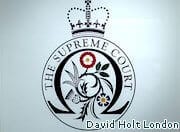The landmark case against Scotland’s controversial Named Person scheme begins today in the UK Supreme Court.
The Christian Institute, CARE, TYMES Trust and the Family Education Trust are bringing the case.
Under the proposals, which are set to come into force nationwide in August, every child in Scotland will be assigned a state guardian or named person from birth to age 18, tasked with looking after their “wellbeing”.
Parents
Colin Hart, Director of The Christian Institute, said the scheme is an “insult to the fundamental human rights of mums and dads to bring up their children the way they see fit”.
He said Named Persons will have enormous powers – becoming involved in issues such as:
Concerns
Two days have been set aside for legal arguments to be heard at the UK’s top court.
Last year Scotland’s highest court rejected the concerns raised. Three judges from the Inner House of the Court of Session ruled that the legislation does not conflict with human rights or data protection laws.
The Named Person scheme is just plain wrong.
Colin Hart
But concerns have been voiced by the Scottish Association of Social Workers, the Law Society of Scotland and the Scottish Parent Teacher Council.
Burden
Mr Hart commented: “The Scottish Government says health visitors will be the state guardians up until a child goes to school.
“But there is a shortage of health visitors and, despite throwing money at the problem to try and employ more, health boards are already saying they don’t have enough and can’t implement the scheme.
“Between the ages of 5 and 18 it falls to senior teachers to fulfil the role.
“But already councils are saying they can’t recruit teachers for senior posts because they don’t want the extra burden of being a named person on top of their already massive workloads.”
Just plain wrong
He added: “This is a compulsory scheme. There is no way for parents to opt out or be the named person for their own kids.
“That means already limited and scarce resources will be spread even further.
“The Named Person scheme is just plain wrong.”

